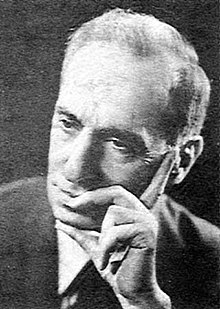Michel Aflaq
Michel Aflaq | |
|---|---|
 | |
| Secretary General of the National Command of the Iraq-based Ba'ath Party | |
| In office February 1968 – 23 June 1989 | |
| Deputy | Ahmed Hassan al-Bakr |
| Preceded by | None–post established |
| Succeeded by | Saddam Hussein |
| Secretary General of the National Command of the Arab Socialist Ba'ath Party | |
| In office 1954 – April 1965 | |
| Preceded by | None–post established |
| Succeeded by | Munif al-Razzaz |
| Personal details | |
| Born | 9 January 1910 Damascus, Ottoman Syria |
| Died | 23 June 1989 (age 79) Paris, France |
| Political party | Arab Ba'ath Movement (1940–1947) Arab Socialist Ba'ath Party (1947–1966) Iraq-based Ba'ath Party (1968–1989) |
Michel Aflaq (Arabic: ميشيل عفلق, Arabic pronunciation: [miːʃeːl ʕaflaq], 9 January 1910 – 23 June 1989) was a Syrian philosopher, sociologist and Arab nationalist. He is considered to be the principal founder of Ba'athism.
